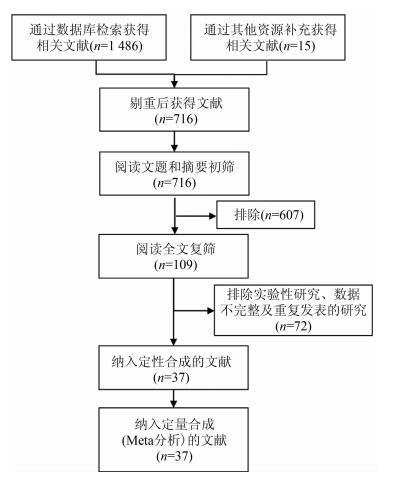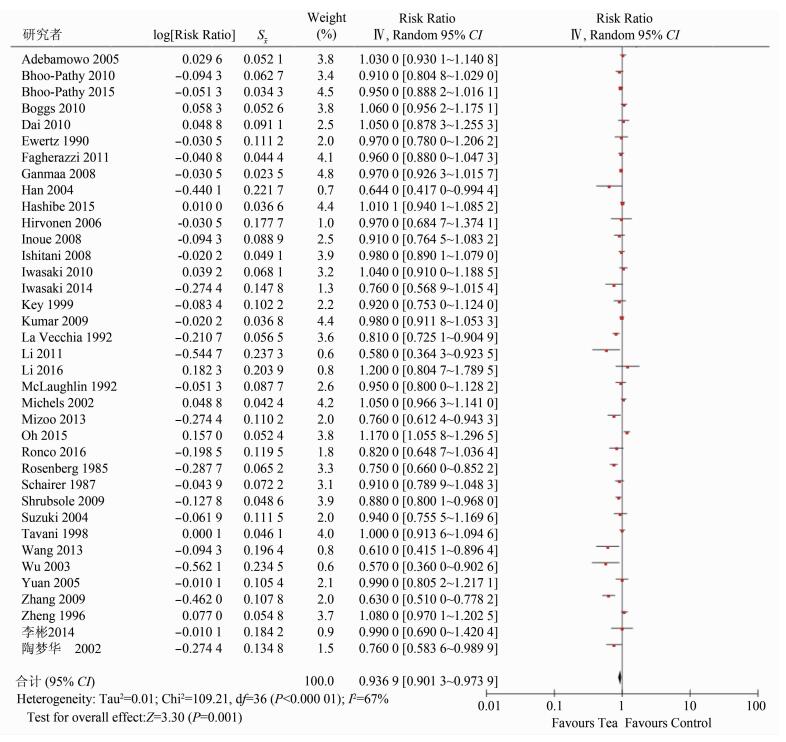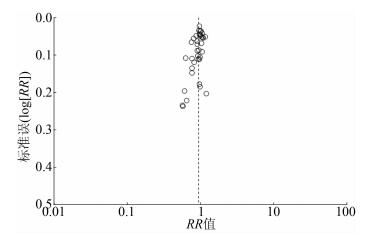扩展功能
文章信息
- 郑佳, 徐婷, 葛霞英, 徐路红, 齐广伟
- ZHENG Jia, XU Ting, GE Xia-ying, XU Lu-hong, QI Guang-wei
- 茶摄入与乳腺癌发病风险关系的系统评价/Meta分析
- Systematic review on relationship between tea intake and breast cancer risk, a Meta-analysis
- 疾病监测, 2017, 32(7): 597-602
- Disease Surveillance, 2017, 32(7): 597-602
- 10.3784/j.issn.1003-9961.2017.07.017
-
文章历史
- 收稿日期:2017-01-01
乳腺癌是女性最常见的恶性肿瘤之一,也是导致女性因肿瘤死亡最主要的原因[1]。流行病学研究显示,乳腺癌低发病率地区的人群,移民到乳腺癌高发病率的国家,乳腺癌的发病率会增高,这说明环境因素和生活习惯在乳腺癌的发病过程中起重要作用[2]。茶是世界上最流行的饮品之一,中国、日本等东亚国家以绿茶为主要饮品,茶中含有表没食子儿茶素没食子酸酯(epigallocatechingallate,EGCG)等多酚类儿茶素,具有抗恶性细胞增生、抑制血管生成的作用[3]。研究提示,饮用绿茶可以减少分化较好的浸润性乳腺癌的复发,并改善一级和二级浸润性乳腺癌的预后[4]。为更全面客观公正地评价茶摄入对乳腺癌发病风险的影响,本研究采用Meta分析方法对国内外相关研究进行系统评价。
1 资料与方法 1.1 纳入和排除标准 1.1.1 研究类型观察性研究,包括队列研究和病例对照研究。
1.1.2 研究对象确诊为乳腺癌的患者,国籍、种族、年龄不限。
1.1.3 暴露因素茶摄入。
1.1.4 结局指标乳腺癌的发病风险。
1.1.5 排除标准① 数据不充分无法获取相关有效数据;② 重复发表;③ 会议摘要类;④ 茶摄入类型为红茶。
1.2 文献检索策略计算机检索PubMed、EMBASE、EBSCO、The Cochrane Library、CNKI、SinoMed、万方和维普数据库。搜集有关茶摄入水平与乳腺癌关系的研究,检索时间为建库起至2016年10月6日。同时手工检索纳入研究的参考文献作为补充。检索采用主题词和自由词相结合的方法,英文检索自由词包括breast、mammary、cancer、carcinoma、neoplasm、tumor;中文检索词为茶、乳腺癌。以PubMed为例,具体检索策略见表 1。
| 代码 | 检索词 |
| #1 | breast |
| #2 | mammary |
| #3 | #1 OR #2 |
| #4 | cancer |
| #5 | carcinoma |
| #6 | neoplasm |
| #7 | tumor |
| #8 | #4 OR #5 OR #6 OR #7 |
| #9 | #3 AND #8 |
| #10 | Breast Neoplasms[Mesh] |
| #11 | #9 OR #10 |
| #12 | tea |
| #13 | tea[Mesh] |
| #14 | #12 OR #13 |
| #15 | #11 AND #14 |
由2位研究员独立筛选文献、提取资料并交叉核对,如有分歧,通过讨论解决。资料提取主要内容:① 纳入文献的基本信息,包括作者、发表时间、研究实施国家等;② 研究对象的基本特征,包括研究对象的样本量、年龄、诊断等;③ 暴露因素,包括茶的类型和摄入水平;④ 结局指标,包括癌症发病率等。
1.4 纳入研究的偏倚风险评价由2位研究员对纳入的队列研究和病例对照研究采用NOS量表(Newcastle-Ottawa scale,NOS)进行质量评价。量表从3个方面共8个条目进行评分,满分为9分;具体包括研究人群选择、可比性、暴露评价或结果评价3个方面。
1.5 统计分析采用RevMan 5.3软件进行Meta分析,以RR值及95%CI作为衡量危险因素的合并效应指标。纳入研究间不存在或异质性较小时(检验水准α=0.1),使用固定效应模型进行Meta分析;若存在显著异质性,则采用随机效应模型分析。Meta分析的检验水准设为α=0.05。本研究通过逐个剔除单个研究或排除低质量的研究对总体分析结果的影响进行敏感性分析,并且根据人群来源、NOS评分、纳入研究类型及茶摄入剂量等进行亚组分析。另外,采用漏斗图评估纳入研究的发表偏倚。
2 结果 2.1 文献检索结果初检出相关文献1 486篇,查重后剔除755篇文献。排除重复发表研究、数据不全的研究后,最后纳入37篇文献。文献筛选流程及结果见图 1。

|
| 图 1 文献筛选流程图 Figure 1 Flow chart of literature selection |
| |
37篇观察性研究文献,包括15个队列研究和22个病例对照研究;关于欧美人群的研究19篇,东亚人群的研究17篇,美籍亚裔人群的研究1篇。英文文献35篇,中文文献2篇。纳入研究的基本特征及偏倚风险评价结果见表 2。
| 纳入研究 | 国家或地区 | 研究类型 | 随访时间(年) | 茶的类型 | 参与者例数 | 年龄组(岁) | 摄入水平 | NOS评分(分) | |
| 病例 | 对照 | ||||||||
| Adebamowo 2005[5] | 美国 | Cohort | 3 | 不详 | 710 | 116 671 | 25~46 | >1杯/月~≥2杯/天 | 8 |
| Bhoo-Pathy 2010[6] | 荷兰 | Cohort | 5 | 不详 | 681 | 27 323 | 20~59 | <1杯/天~>5杯/天 | 8 |
| Bhoo-Pathy 2015[7] | 欧洲 | Cohort | 9 | 不详 | 10 198 | 335 060 | 25~70 | 低摄入~高摄入 | 8 |
| Boggs 2010[8] | 美国 | Cohort | 12 | 不详 | 1 268 | 52 062 | 21~69 | <1杯/天~>4杯/天 | 9 |
| Dai 2010[9] | 中国 | Cohort | 8 | 绿茶 | 614 | 74 861 | 40~70 | ≤1.67 g/天~>5 g/天 | 9 |
| Ewertz 1990[10] | 丹麦 | C-C | 2 | 不详 | 1 474 | 1 322 | 不详 | <1杯/天~>5杯/天 | 5 |
| Fagherazzi 2011[11] | 法国 | Cohort | 11 | 不详 | 2 868 | 67 703 | 40~65 | ≤1杯/天~>3杯/天 | 9 |
| Ganmaa 2008[12] | 美国 | Cohort | 22 | 不详 | 5 272 | 85 987 | 30~55 | <1杯/月~≥4杯/天 | 7 |
| Han 2004[13] | 中国 | C-C | 1 | 不详 | 213 | 430 | 25~75 | >1杯/天 | 7 |
| Hashibe 2015[14] | 美国 | Cohort | 10 | 不详 | 1 703 | 50 563 | 55~74 | <1杯/月~≥6杯/天 | 9 |
| Hirvonen 2006[15] | 法国 | Cohort | 7 | 不详 | 95 | 4 396 | 35~60 | >1 ml/天~≥350 ml/天 | 9 |
| Inoue 2008[16] | 新加坡 | C-C | 7 | 绿茶 | 380 | 662 | 45~74 | 1杯/周~1杯/天 | 8 |
| Ishitani 2008[17] | 美国 | Cohort | 10 | 不详 | 1 188 | 38 432 | ≥45 | <1杯/天~≥2杯/天 | 7 |
| Iwasaki 2010[18] | 日本 | Cohort | 14 | 绿茶 | 845 | 53 793 | 40~69 | <1杯/周~≥5杯/天 | 8 |
| Iwasaki 2014[19] | 日本 | C-C | 5 | 绿茶 | 369 | 269 | 20~74 | >1 ml/天~≥600 ml/天 | 9 |
| Key 1999[20] | 日本 | Cohort | 24 | 绿茶 | 427 | 34 759 | 不详 | ≤1杯/天~≥5杯/天 | 9 |
| Kumar 2009[21] | 美国 | C-C | 4 | 不详 | 5 059 | 4 486 | 20~74 | <1杯/天~≥3杯/天 | 6 |
| La Vecchia 1992[22] | 意大利 | C-C | 8 | 不详 | 2 860 | 3 625 | <75 | 不详 | 4 |
| Li 2011[23] | 中国 | C-C | 1 | 绿茶 | 540 | 540 | 18~85 | <500g/年~≥1000g/年 | 8 |
| Li 2016[1] | 香港 | C-C | 3 | 绿茶 | 756 | 789 | 20~84 | <1杯/天~>3杯/天 | 6 |
| McLaughlin 1992[24] | 美国 | C-C | 3 | 不详 | 1 617 | 1 617 | 20~79 | 不详 | 5 |
| Michels 2002[25] | 瑞典 | Cohort | 11 | 不详 | 1 271 | 59 036 | 40~76 | <1杯/周~≥4杯/天 | 8 |
| Mizoo 2013[26] | 日本 | C-C | 1 | 绿茶 | 472 | 464 | >20 | <1次/周~≥4次/周 | 7 |
| Oh 2015[27] | 日本 | C-C | 1 | 绿茶 | 369 | 369 | 20~74 | >1 ml /天~≥600 ml/天 | 8 |
| Ronco 2016[28] | 乌拉圭 | C-C | 9 | 不详 | 572 | 889 | 不详 | >1 ml /天~≥251 ml/天 | 5 |
| Rosenberg 1985[29] | 美国 | C-C | 8 | 不详 | 2 651 | 1 501 | 30~69 | 1-2杯/天~≥5杯/天 | 6 |
| Schairer 1987[30] | 美国 | C-C | 5 | 不详 | 1 510 | 1 882 | 不详 | ≤1杯/天~≥5杯/天 | 6 |
| Shrubsole 2009[31] | 中国 | C-C | 10 | 绿茶 | 3 454 | 3 474 | 25~70 | <1杯/天~>1杯/天 | 7 |
| Suzuki 2004[32] | 日本 | Cohort | 9 | 绿茶 | 222 | 35 004 | 40~64 | <1杯/天~≥5杯/天 | 8 |
| Tavani 1998[33] | 意大利 | C-C | 12 | 不详 | 5 984 | 5 504 | 22~74 | 不详 | 5 |
| Wang 2013[34] | 台湾 | C-C | 2 | 绿茶 | 157 | 314 | 32~76 | 不详 | 7 |
| Wu 2003[35] | 美国 | C-C | 9 | 绿茶 | 501 | 594 | 25~74 | 0~>85.7 ml/天 | 6 |
| Yuan 2005[3] | 新加坡 | C-C | 6 | 绿茶 | 297 | 665 | 45~74 | >1次/月~>1次/周 | 6 |
| Zhang 2009[36] | 中国 | C-C | 2 | 绿茶 | 1 009 | 1 009 | 20~87 | 低摄入~高摄入 | 6 |
| Zheng 1996[37] | 美国 | Cohort | 8 | 不详 | 2 936 | 35 369 | 55~69 | 1次/周~≥2次/天 | 7 |
| 李彬2014[38] | 中国 | C-C | 2 | 绿茶 | 464 | 464 | 25~70 | <1杯/天~≥3杯/天 | 7 |
| 陶梦华2002[39] | 中国 | C-C | 1 | 不详 | 356 | 925 | 30~74 | ≤1.2两/月~>6两/月 | 5 |
| 注:C-C:病例-对照研究;Cohort:队列研究 | |||||||||
共纳入37个研究,包括61 362例乳腺癌患者和1 102 813名对照。随机效应模型Meta分析结果显示,茶摄入可减小乳腺癌6%的发病风险(RR=0.936 9,95%CI:0.901 3~ 0.973 9,P=0.001),见图 2。敏感性分析结果显示,分别剔除Rosenberg 1985[29]、Zhang 2009[36]和Oh 2015[27]的研究后异质性轻度减小,但结果仍显示茶摄入可减小乳腺癌的发病风险(RR=0.947,95%CI:0.912~0.982;RR=0.947,95%CI:0.913~ 0.983;RR=0.931,95%CI:0.896~ 0.966)。

|
| 图 2 茶摄入与乳腺癌发病风险关系的Meta分析 Figure 2 Meta analysis on relationship between tea intake and breast cancer risk |
| |
进一步根据NOS评分、人群来源及文献研究类型进行亚组分析。结果显示不同质量评分的研究、病例-对照研究、茶摄入类型为绿茶或不详、欧美人群及东亚人群的研究都提示茶摄入能减小乳腺癌的发病风险(均P<0.05),见表 3。
| 亚组 | 纳入研究数量 | 异质性 | 效应模型 | RR值(95%CI) | P值 | ||
| χ2值 | P值 | I2(%) | |||||
| NOS评分 | 37 | 109.210 | <0.001 | 67 | 随机 | 0.937(0.901~0.974) | 0.001 |
| ≥6 | 31 | 93.760 | <0.001 | 68 | 随机 | 0.945(0.906~0.986) | 0.008 |
| <6 | 6 | 11.540 | 0.040 | 57 | 随机 | 0.894(0.809~0.989) | 0.030 |
| 研究类型 | 37 | 109.210 | <0.001 | 67 | 随机 | 0.937(0.901~0.974) | 0.001 |
| 队列研究 | 15 | 13.220 | 0.510 | 0 | 固定 | 0.991(0.968~1.015) | 0.470 |
| 病例对照研究 | 22 | 80.440 | <0.001 | 74 | 随机 | 0.863(0.803~0.929) | <0.001 |
| 人群 | 36 | 103.240 | <0.001 | 66 | 随机 | 0.947(0.912~0.983) | 0.004 |
| 东亚 | 17 | 59.420 | <0.001 | 73 | 随机 | 0.901(0.823~0.987) | 0.020 |
| 欧美 | 19 | 43.310 | <0.001 | 58 | 随机 | 0.963(0.929~0.999) | 0.040 |
| 茶摄入类型 | 37 | 109.210 | <0.001 | 67 | 随机 | 0.937(0.901~0.974) | 0.001 |
| 绿茶 | 16 | 58.000 | <0.001 | 74 | 随机 | 0.885(0.800~0.978) | 0.020 |
| 不详 | 21 | 49.980 | <0.001 | 60 | 随机 | 0.956(0.921~0.993) | 0.020 |
| 茶摄入剂量 | 21 | 69.400 | <0.001 | 21 | 随机 | 0.961(0.926~0.997) | 0.040 |
| <2杯/天 | 16 | 14.410 | 0.490 | 0 | 固定 | 0.990(0.960~1.021) | 0.540 |
| ≥2杯/天 | 19 | 51.020 | <0.001 | 65 | 随机 | 0.938(0.876~1.004) | 0.060 |
在漏斗两侧分布对称性较好,见图 3,只有少数研究偏离中轴,且本研究全面检索了中英文数据库,纳入研究均没有相关的利益冲突,提示本研究存在发表偏倚的可能性较小。

|
| 图 3 文献发表偏倚漏斗图 Figure 3 Publication bias funnel plot |
| |
Meta分析结果显示,茶摄入约能降低6%罹患乳腺癌的风险。亚组分析结果显示,茶摄入类型为绿茶的人群罹患乳腺癌的风险大约能下降12%,这可能与绿茶内含有大量的多酚类儿茶素有关[40],儿茶素具有强大的抗氧化和抑制亚硝化作用。啮齿类动物实验提示,绿茶提取物或儿茶素能抑制乳腺肿瘤的生长速度并降低其侵袭性[41]。而在红茶中,儿茶素大部分被氧化成茶黄素和茶红素。
研究人群分类的亚组分析结果显示,东亚人群茶摄入有明显抑制乳腺癌的作用,能减少10%乳腺癌的发病风险,而欧美人群茶摄入观察到的这种抑癌保护作用较小(4%),这可能和东亚国家(中国、日本、新加坡)茶摄入的种类主要为绿茶、以及人种易感性的差异有关。不同剂量茶摄入的亚组分析,没有观察到茶摄入抑制乳腺癌有明显的剂量效用,但也应注意到≥2杯/天茶摄入量有轻微的降低乳腺癌发病风险的作用。
3.2 证据的质量与证据的适用性、完整性本研究既纳入了队列研究,也纳入了病例-对照研究。亚组分析结果显示,病例-对照研究亚组提示茶摄入降低女性罹患乳腺癌的风险,而队列研究则没有显示这种效应。值得注意的是,大多数茶摄入能抑制恶性肿瘤发病的流行病学证据都来自于回顾性的病例-对照研究,其所有的暴露因素证据都来自于历史回忆,回忆偏倚是难以避免的,这可以部分解释队列研究和病例-对照研究结果的不同。基于病例-对照研究的这种局限性,对于茶摄入能降低女性罹患乳腺癌风险的效应解释需谨慎。
对流行病学研究进行方法学质量评价是非常必要的,如果纳入质量较低的原始研究,更加容易导致偏倚。本研究纳入的文献质量较高,方法学质量评分的中位数为7分,有31篇文献评分>6分,有6篇文献评分<6分。NOS评分亚组分析显示,评分>6分和<6分研究间无明显的异质性,本研究各纳入文献间的异质性不能用文献的质量来解释,可由研究人群、茶摄入类型以及研究类型的不同部分来解释。
3.3 本系统评价的意义及对未来研究的启示本系统评价提示茶摄入能降低乳腺癌的发病风险,特别是针对东亚人群及茶摄入类型为绿茶时。同时,我们也要注意到,队列研究的证据没有提示茶摄入有明显抑制乳腺癌发病的作用,且没有发现茶摄入有抑制乳腺癌的剂量效用,加之考虑各研究间的异质性等因素,茶摄入抑制乳腺癌发病风险的效能可能会更低。
既往的研究还发现,特定基因型与茶摄入在抑制乳腺癌发病方面有非常强的交互作用。例如高活跃ACE基因型的人群饮茶能起到抑制乳腺癌发病的作用,大约能减少70%的乳腺癌发病风险[3];摄入绿茶可降低COMT-HL、COMT-LL基因型约58%的发病风险[42]。这可能是由于这两个基因型无法快速地使儿茶素代谢所致[43]。在后续研究中,茶摄入和基因多态性在抑制乳腺癌发病中的交互作用应引起重视。
作者贡献:
郑佳 ORCID:0000-0003-3037-011X
郑佳:资料收集、检索文献、提取数据、数据统计与分析、撰写文章
徐婷:资料收集、撰写文章
葛霞英:资料收集、撰写文章
徐路红:提取数据
齐广伟:检索文献、提取数据、数据统计与分析
| [1] |
Li MJ, Tse LA, Chan WC, et al. Evaluation of breast cancer risk associated with tea consumption by menopausal and estrogen receptor status among Chinese women in Hong Kong[J]. Cancer Epidemiol, 2016, 40: 73-78. DOI:10.1016/j.canep.2015.11.013 |
| [2] |
Steinitz R, Parkin DM, Young JL, et al. Cancer incidence in Jewish migrants to Israel, 1961-1981[M]. Lyon: International Agency for Research on Cancer, 1989: 1-311.
|
| [3] |
Yuan JM, Koh WP, Sun CL, et al. Green tea intake, ACE gene polymorphism and breast cancer risk among Chinese women in Singapore[J]. Carcinogenesis, 2005, 26(8): 1389-1394. DOI:10.1093/carcin/bgi080 |
| [4] |
Nakachi K, Suemasu K, Suga K, et al. Influence of drinking green tea on breast cancer malignancy among Japanese patients[J]. Jpn J Cancer Res, 1998, 89(3): 254-261. DOI:10.1111/cas.1998.89.issue-3 |
| [5] |
Adebamowo CA, Cho E, Sampson L, et al. Dietary flavonols and flavonol-rich foods intake and the risk of breast cancer[J]. Int J Cancer, 2005, 114(4): 628-633. DOI:10.1002/(ISSN)1097-0215 |
| [6] |
Bhoo Pathy N, Peeters PH, van Gils C, et al. Coffee and tea intake and risk of breast cancer[J]. Breast Cancer Res Treat, 2010, 121(2): 461-467. DOI:10.1007/s10549-009-0583-y |
| [7] |
Bhoo Pathy N, Peeters PH, Uiterwaal CSPM, et al. Coffee and tea consumption and risk of pre-and postmenopausal breast cancer in the European Prospective Investigation into Cancer and Nutrition (EPIC) cohort study[J]. Breast Cancer Res, 2015, 17(1): 15. DOI:10.1186/s13058-015-0521-3 |
| [8] |
Boggs DA, Palmer JR, Stampfer MJ, et al. Tea and coffee intake in relation to risk of breast cancer in the Black Women's Health Study[J]. Cancer Causes Control, 2010, 21(11): 1941-1948. DOI:10.1007/s10552-010-9622-6 |
| [9] |
Dai Q, Shu XO, Li HL, et al. Is green tea drinking associated with a later onset of breast cancer?[J]. Ann Epidemiol, 2010, 20(1): 74-81. DOI:10.1016/j.annepidem.2009.09.005 |
| [10] |
Ewertz M, Gill C. Dietary factors and breast-cancer risk in Denmark[J]. Int J Cancer, 1990, 46(5): 779-784. DOI:10.1002/(ISSN)1097-0215 |
| [11] |
Fagherazzi G, Touillaud MS, Boutron-Ruault MC, et al. No association between coffee, tea or caffeine consumption and breast cancer risk in a prospective cohort study[J]. Public Health Nutr, 2011, 14(7): 1315-1320. DOI:10.1017/S1368980011000371 |
| [12] |
Ganmaa D, Willett WC, Li TY, et al. Coffee, tea, caffeine and risk of breast cancer: a 22-year follow-up[J]. Int J Cancer, 2008, 122(9): 2071-2076. DOI:10.1002/ijc.23336 |
| [13] |
Han DF, Ma J, Zhou X, et al. A case-control study on the risk of female breast cancer in Wuhan area[J]. Chinese Journal of Epidemiology, 2004, 25(3): 256-260. (in Chinese) 韩定芬, 马骏, 周新, 等. 武汉地区女性乳腺癌危险因素的病例对照研究[J]. 中华流行病学杂志, 2004, 25(3): 256-260. |
| [14] |
Hashibe M, Galeone C, Buys SS, et al. Coffee, tea, caffeine intake, and the risk of cancer in the PLCO cohort[J]. Br J Cancer, 2015, 113(5): 809-816. DOI:10.1038/bjc.2015.276 |
| [15] |
Hirvonen T, Mennen LI, de Bree A, et al. Consumption of antioxidant-rich beverages and risk for breast cancer in French women[J]. Ann Epidemiol, 2006, 16(7): 503-508. DOI:10.1016/j.annepidem.2005.09.011 |
| [16] |
Inoue M, Robien K, Wang RW, et al. Green tea intake, MTHFR/TYMS genotype and breast cancer risk: the Singapore Chinese Health Study[J]. Carcinogenesis, 2008, 29(10): 1967-1972. DOI:10.1093/carcin/bgn177 |
| [17] |
Ishitani K, Lin J, Manson JE, et al. Caffeine consumption and the risk of breast cancer in a large prospective cohort of women[J]. Arch Intern Med, 2008, 168(18): 2022-2031. DOI:10.1001/archinte.168.18.2022 |
| [18] |
Iwasaki M, Inoue M, Sasazuki S, et al. Green tea drinking and subsequent risk of breast cancer in a population to based cohort of Japanese women[J]. Breast Cancer Res, 2010, 12(5): R88. DOI:10.1186/bcr2756 |
| [19] |
Iwasaki M, Mizusawa J, Kasuga Y, et al. Green tea consumption and breast cancer risk in Japanese women: a case-control study[J]. Nutr Cancer, 2014, 66(1): 57-67. DOI:10.1080/01635581.2014.847963 |
| [20] |
Key TJ, Sharp GB, Appleby PN, et al. Soya foods and breast cancer risk: a prospective study in Hiroshima and Nagasaki, Japan[J]. Br J Cancer, 1999, 81(7): 1248-1256. DOI:10.1038/sj.bjc.6690837 |
| [21] |
Kumar N, Titus-Ernstoff L, Newcomb PA, et al. Tea consumption and risk of breast cancer[J]. Cancer Epidemiol Biomarkers Prev, 2009, 18(1): 341-345. DOI:10.1158/1055-9965.EPI-08-0819 |
| [22] |
La Vecchia C, Negri E, Franceschi S, et al. Tea consumption and cancer risk[J]. Nutr Cancer, 1992, 17(1): 27-31. DOI:10.1080/01635589209514170 |
| [23] |
Li L, Zhang M, Holman D. Population versus hospital controls for case-control studies on cancers in Chinese hospitals[J]. BMC Med Res Methodol, 2011, 11(1): 167. DOI:10.1186/1471-2288-11-167 |
| [24] |
McLaughlin CC, Mahoney MC, Nasca PC, et al. Breast cancer and methylxanthine consumption[J]. Cancer Causes Control, 1992, 3(2): 175-178. DOI:10.1007/BF00051658 |
| [25] |
Michels KB, Holmberg L, Bergkvist L, et al. Coffee, tea, and caffeine consumption and breast cancer incidence in a cohort of Swedish women[J]. Ann Epidemiol, 2002, 12(1): 21-26. DOI:10.1016/S1047-2797(01)00238-1 |
| [26] |
Mizoo T, Taira N, Nishiyama K, et al. Effects of lifestyle and single nucleotide polymorphisms on breast cancer risk: a case-control study in Japanese women[J]. BMC Cancer, 2013, 13(1): 565. DOI:10.1186/1471-2407-13-565 |
| [27] |
Oh JK, Sandin S, Ström P, et al. Prospective study of breast cancer in relation to coffee, tea and caffeine in Sweden[J]. Int J Cancer, 2015, 137(8): 1979-1989. DOI:10.1002/ijc.29569 |
| [28] |
Ronco AL, Stefani ED, Mendoza B, et al. Mate and tea intake, dietary antioxidants and risk of breast cancer: a case-control study[J]. Asian Pac J Cancer Prev, 2016, 17(6): 2923-2933. |
| [29] |
Rosenberg L, Miller DR, Helmrich SP, et al. Breast cancer and the consumption of coffee[J]. Am J Epidemiol, 1985, 122(3): 391-399. DOI:10.1093/oxfordjournals.aje.a114120 |
| [30] |
Schairer C, Brinton LA, Hoover RN. Methylxanthines and breast cancer[J]. Int J Cancer, 1987, 40(4): 469-473. DOI:10.1002/(ISSN)1097-0215 |
| [31] |
Shrubsole MJ, Lu W, Chen Z, et al. Drinking green tea modestly reduces breast cancer risk[J]. J Nutr, 2009, 139(2): 310-316. |
| [32] |
Suzuki Y, Tsubono Y, Nakaya N, et al. Green tea and the risk of breast cancer: pooled analysis of two prospective studies in Japan[J]. Br J Cancer, 2004, 90(7): 1361-1363. DOI:10.1038/sj.bjc.6601652 |
| [33] |
Tavani A, Pregnolato A, La Vecchia C, et al. Coffee consumption and the risk of breast cancer[J]. Eur J Cancer Prev, 1998, 7(1): 77-82. |
| [34] |
Wang L, Liao WC, Tsai CJ, et al. The effects of perceived stress and life style leading to breast cancer[J]. Women Health, 2013, 53(1): 20-40. DOI:10.1080/03630242.2012.732680 |
| [35] |
Wu AH, Yu MC, Tseng CC, et al. Green tea and risk of breast cancer in Asian Americans[J]. Int J Cancer, 2003, 106(4): 574-579. DOI:10.1002/(ISSN)1097-0215 |
| [36] |
Zhang M, Huang J, Xie X, et al. Dietary intakes of mushrooms and green tea combine to reduce the risk of breast cancer in Chinese women[J]. Int J Cancer, 2009, 124(6): 1404-1408. DOI:10.1002/ijc.v124:6 |
| [37] |
Zheng W, Doyle TJ, Kushi LH, et al. Tea consumption and cancer incidence in a prospective cohort study of postmenopausal women[J]. Am J Epidemiol, 1996, 144(2): 175-182. DOI:10.1093/oxfordjournals.aje.a008905 |
| [38] |
Li B, Wang L, Mo XF, et al. Tea drinking and susceptibility to breast cancer: case-control study[J]. South China Journal of Preventive Medicine, 2014, 40(3): 201-207. (in Chinese) 李彬, 汪莲, 莫雄飞, 等. 饮茶与女性乳腺癌易感性的病例对照研究[J]. 华南预防医学, 2014, 40(3): 201-207. |
| [39] |
Tao MH, Liu DK, Gao LF, et al. Association between green tea drinking and breast cancer risk[J]. Tumor, 2002, 22(3): 176-180. (in Chinese) 陶梦华, 刘大可, 高立峰, 等. 饮茶与女性乳腺癌的关系[J]. 肿瘤, 2002, 22(3): 176-180. |
| [40] |
Yang CS, Ju J, Lu G, et al. Cancer prevention by tea and tea polyphenols[J]. Asia Pac J Clin Nutr, 2008, 17(Suppl 1): 245-248. |
| [41] |
Kavanagh KT, Hafer LJ, Kim DW, et al. Green tea extracts decrease carcinogen-induced mammary tumor burden in rats and rate of breast cancer cell proliferation in culture[J]. J Cell Biochem, 2001, 82(3): 387-398. DOI:10.1002/(ISSN)1097-4644 |
| [42] |
Wu AH, Tseng CC, van den Berg D, et al. Tea intake, COMT genotype, and breast cancer in Asian-American women[J]. Cancer Res, 2003, 63(21): 7526-7529. |
| [43] |
Yang CS, Chung JY, Yang GY, et al. Mechanisms of inhibition of carcinogenesis by tea[J]. Bio Factors, 2000, 13(1/4): 73-79. |
 2017, Vol. 32
2017, Vol. 32


